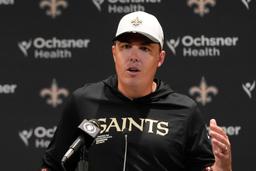Former Chiefs Star Free Agent Struggles to Find New Team, Eyes Reunion
KANSAS CITY, Mo. – A former standout defensive tackle for the Kansas City Chiefs, is facing a challenging free agency period. The Topeka native, who last played for the Chiefs in the 2024 season, has garnered minimal interest from NFL teams and is now hoping for a return to Arrowhead Stadium, sources told The Athletic on Thursday.
Pennel, 34, was a key rotational player for the Chiefs from 2019-2020 and again from 2023-2024, appearing in 39 games with 82 tackles, four sacks, and a forced fumble across his stints. A fan favorite for his run-stuffing prowess, he earned a career-high three sacks in 2024 and played a pivotal role in Kansas City’s Super Bowl LVIII victory, logging six tackles against the San Francisco 49ers. Despite his contributions, Pennel’s one-year, $1.42 million deal expired, leaving him as an unrestricted free agent.
“Kansas City is my heart,” Pennel told reporters. “I’d love to finish what I started with Coach Reid and the guys.”
The 6-foot-4, 330-pound lineman’s market has been quiet, with teams like the Pittsburgh Steelers and Philadelphia Eagles passing on the veteran. His age and limited pass-rush upside—never exceeding 35 tackles in a season—have cooled interest, despite his proven run-defense skills. In 2024, Pennel ranked 13th among interior linemen with at least 150 run-defense snaps, per Pro Football Focus, but his 320 defensive snaps were a career low for a full season.
Pennel’s peak came in 2019, when he joined the Chiefs midseason and transformed their run defense, helping secure Super Bowl LIV. His emotional pre-game speech before the game endeared him to fans. However, his 2024 campaign was marred by a hamstring injury during a Christmas Day win over Pittsburgh, limiting his late-season impact.
The Chiefs, with $38 million in cap space, could consider a reunion. Their defensive line, anchored by Chris Jones, lacks depth with Derrick Nnadi and Tershawn Wharton also free agents. Pennel’s familiarity with Steve Spagnuolo’s system and his chemistry with Jones—“Being on the field with him makes my job easier,” he once said—could make a low-cost deal appealing.
Fans are split. “Pennel’s a warrior—bring him back!” one posted on X. Another argued, “He’s slowing down. We need young blood like Fabien Lovett.” The Chiefs’ recent draft pick, Omarr Norman-Lott, signals a youth movement, potentially sidelining veterans like Pennel.
“I’ve still got gas in the tank,” Pennel insisted.
A return isn’t guaranteed. Kansas City’s focus on younger talent, like undrafted rookie Fabien Lovett Sr., may outweigh Pennel’s experience. His roots in Topeka and two Super Bowl rings keep his hopes alive, but will the Chiefs roll out the red carpet?












